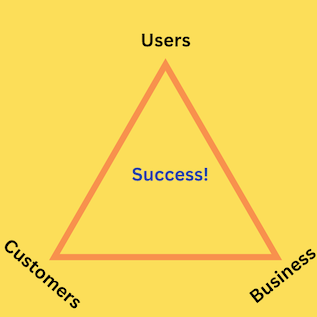The ONLY Measure of Product Management Success is the Success of Your Product
Outcomes over outputs, baby, outcomes over outputs
We’re talking about “product success” today but, before we get to it, I wanted to let you know about a free lightning lesson that I’m running with my co-conspirator Saeed Khan on Tuesday 15th October entitled “5 Ways to Improve the B2B Product/Sales Relationship“. Sign up to attend live or if you just want to get hold of the recording afterwards!
Ah, product management! That wonderful intersection of the ephemeral concepts of “business” and “users” and “technology”. The subject of so many books, talks, blog posts and podcasts. Such an essential role for any organisation looking to build winning products and solve our users’ most important jobs to be done.
So why’s it so darned hard to get a straight answer about what a product manager should actually be doing?
The Elusive Definition of Product Management
I used to ask “the barbeque question” on my podcast, which goes something like:
“Imagine you’re at a barbeque and meet some random stranger. You get talking and they say they’re a lawyer (or whatever) and ask you what you do for a living. How do you answer?”
The question has stumped even quite well-known product management thought leaders and influencers, simply because there’s no one right answer. There’s no ISO standard definition for a product manager. Which makes defining what a good one looks like pretty tricky (although some have tried).
Some people like to try to come up with a definitive definition. They might talk about the somewhat intangible concept of “product sense”. They might talk about “outcomes over outputs” or “user-centricity”. These words are all great, and I believe in them, but the simple fact is that product management doesn’t exist in a vacuum. However we define ourselves, others will have expectations of us based on factors we can’t easily control:
The context of our company (B2B, B2C, B2G etc).
The biases of the founders and other leaders within the organisation
The types of customers we sell to and the markets we serve
The types of products we sell, and whether they’re part of a product/service mix
The overall maturity of the organisation and its products
All of these combine to create a muddled picture, where our leaders and colleagues might have a very different view of what we should be doing, and this can cause tension.
The Different Territories of Product Management
Many people try to define product management by its practices; the way the work is done. There are many, many books about how to do product management “properly”, written by people who have seen the best and worst of product management (and written down the best). Generally speaking, these books are all broadly aligned on the general principles of good product management. I also guarantee that the vast majority of your colleagues haven’t read them.
The “territories” we believe we should be active in include, but are not limited to:
Developing a product vision and supporting product strategy
Gathering evidence and feedback first-hand from real customers
Deciding which problems and opportunities to solve
Generating and evaluating solutions
Prioritising use cases and making necessary trade-offs
Building products that demonstrate continuous value
Launching and releasing products to market, and tracking their success
We want to do all of these things and do them cross-functionally, collaborating across the business and especially with our “product trios” of developers, product managers and designers. We want to be empowered, lead product decision-making and be seen as strategic partners to the business.
Many product managers are disappointed about how much of this they actually get to do, primarily because many business leaders believe the role of product management is:
Take orders from the sales team
Write up a nice product requirements document and some tickets
Check-in with the developers (or “speed up delivery”)
Tell “the business” when stuff is done and they can sell it
How is a product manager expected to do a good job in these circumstances? What does a good job even mean?
The True Measure of a Product Manager: Product Success
Many product managers are guilty of preaching “outcomes over output” as a mantra and then start focusing incredibly hard on the way we do the work (or are prevented from doing it) rather than the results of the work. We concentrate on the “outputs” (the processes we follow) rather than the outcomes (the success of our product). Ultimately, a product manager is only successful if their product is successful.
What does “product success” look like? Well, consider the stakeholders of a typical B2B product:
They’re all pretty self-explanatory but, for the record:
Business - The people you work for! Success here looks like recurring revenue, retention, growth and profit.
Customers - The people who buy your product. In B2C, these will probably be your users too, but in B2B they may be entirely different and have different motivations. Success here looks like solving all the use cases for their business, regulatory compliance, a fair price and making the economic buyer look good.
Users - The people spending time using your solution. Success here looks like having a product that solves their problem well, is easy to use and makes their lives better in some way.
Precisely where product managers focus in this triangle varies per company, and often within a company too, depending on business goals at a particular time. There’s no right or wrong in these decisions; it’s all about choices. But these choices need to be made and product managers need to understand what is expected of them, and what success looks like in their context.
And then do whatever is necessary to achieve that success.
Does This Mean Best Practices Don’t Matter?
No, not at all! It simply means that they’re less important than creating a successful product. We live by “outcomes over outputs” so we must die by “outcomes over outputs”! It doesn’t matter how well we execute product management practices, how well we collaborate, the quality of our PRDs, how many user interviews we did this week or whether our burndown is a nice gradient if the product is not successful.
The reason the product “best practices” matter is that they’re the best hypotheses we have about how to deliver successful products. They are, however, not immutable. No two companies work the same, even the Big Tech firms that are touted as the best of the best. These processes, methodologies and working norms are there to serve us and our product. They’re not performative.
There’s another important factor, of course, which is that these ways of working tend to make work… well, bearable. Working in a psychologically safe, collaborative environment with a clear strategy and evidence-based decision-making just feels better. Few people want to work in a toxic, top-down organisation that treats them like a resource. I strongly believe in the principles behind good product management, and that people should aspire to live up to as many of them as possible.
But, if you do all that and your product is not successful, can you really say you’ve succeeded as a product manager?
Wrapping Up
In the end, a product manager is only truly successful if their product is successful, and their product is only successful if it delivers value to all its stakeholders.
As product managers, we should:
Focus on delivering user, customer and business value
Be willing to adapt our processes based on our unique context
Prioritise outcomes over outputs in our ways of working as well as our products
Are you doing everything you can to make your product successful?
I’ve been rather lazy with my newsletter writing recently, so there are far too many podcast episodes to list out here and double the size of the email. Check out the podcast website, or the YouTube channel if you want to go deep on Customer Success with Nick Mehta from Gainsight, Stakeholder Management with Rina Alexin from Productside or nail your LinkedIn game with Ivana Todorovic from AuthoredUp. And much more besides!




Hi Jason,
I'm loathe to disagree, however I think product success only truly measures the success of the product, not the product _manager_ directly.
To take a case in point from the B2B world, even if a product manager does absolutely everything they can in their power (and with their team) to ensure the product is the right fit for the target market, they can't force a sales team to sell it.
I've seen situations where product managers are stymied because the sales team believes learning a new product to sell it is too much effort over tried and tested ones for which they already have the patter down. Nothing wrong with the product other than it's new to the sales team. Sales quotas (where commission is dependent on selling certain combinations of products and services over others) can also chuck a spanner in the works.
I agree that a successful product is generally a good indirect indication that the product manager is doing their job well (although even then there's blind luck as an occasional false positive), however the reverse is not always the case, simply because B2B PMs in particular are not always in direct control of the route to market.
I also concede that part of a PM's role is to work closely with other teams, including sales, to ensure that the product has the best chance possible in the market. Alas, not all teams are as cooperative as they can be, especially when misaligned incentives pull them in different directions to the product strategy.
From your own experiences, Jason, how do you define success in product managers when they're working with one hand tied behind their back like this?
Cheers,
Jock
Say I tell you that I have the winning lottery numbers for next week. You decline to join me, but I turn out right. You just cost yourself millions - were you wrong?
The quality of a decision is measure by the process that led to the decision, not by its outcome. You can learn from outcomes (both good and bad) and improve of your decision making process over time (eg was there information you could have gotten, that would have changed your decision?). But sometimes you do everything "right" and still get the wrong outcome.
And Product Management is nothing but a thousand small decisions every day. So paying attention to how you make those decisions (data, insights, biases) is the right measure in the long term. More complex and not as sexy as $$$, but far more accurate.